Video Presentations of the "1st Conference on Integrating Early Detection of Heart and Lung Disease through Low-Dose CT": Day 1 Session 1: From Intervention to Prevention
- Dec 30, 2024
- 8 min read
Thursday, September 19, 2024 | New York Academy of Medicine (NYAM)
1216 5th Ave, New York, NY 10029
Dr. Roxana Mehran emphasized the shift from intervention to prevention in cardiology, highlighting the importance of optimizing stent placement using intravascular imaging and physiology. She discussed the benefits of personalized antiplatelet and antithrombotic regimens, the potential of factor 11 inhibitors, and the need for aggressive LDL-lowering strategies. Dr. Mehran also stressed the significance of addressing residual risks and the importance of considering biological differences in treatment, particularly in women.
Watch Dr. Roxana Mehran's Presentation Below:
See Dr. Roxana Merhan's Slides Below:
-
Transcript of Dr. Roxana Mehran's Presentation:
[Roxana Mehran] [0.40s] So good morning, everyone, and welcome to our neck of the woods.
[Roxana Mehran] [3.44s] We're very excited, and my clock is already running, and I better start.
[Roxana Mehran] [8.48s] So let's start.
[Roxana Mehran] [9.52s] It's from intervention to prevention, a new theme, I think, for us as interventional cardiologists.
[Roxana Mehran] [17.39s] You will see it all over TCT.
[Roxana Mehran] [19.23s] I am the one of the course directors at TCT.
[Roxana Mehran] [22.27s] Important for you to note my disclosure specifically to the center that I run here at Mount Sinai, and I'm really excited to talk to you about optimizing and making our interventions durable by prevention.
[Roxana Mehran] [37.19s] And, of course, this whole idea of intervention to prevention is something that we all must be thinking about.
[Roxana Mehran] [45.15s] So one way, best way is right there in the cath lab with optimizing how we place our stents using intravascular imaging and physiology, and the evidence is massive supporting this now.
[Roxana Mehran] [60.32s] And we're hoping to see guidelines get up there with a class one indication in the United States, ACC We're waiting for those.
[Roxana Mehran] [70.08s] But, certainly, you see very, very clearly when you image, when you optimize your stents, the patients do better.
[Roxana Mehran] [78.67s] We know this.
[Roxana Mehran] [79.95s] And in fact, the newest data with, OCT guidance showing massive improvements in ischemic events after guiding your intervention using optical coherence tomography.
[Roxana Mehran] [96.79s] But what about this?
[Roxana Mehran] [98.63s] I didn't like this study at all.
[Roxana Mehran] [100.47s] I know a lot of you might have liked it.
[Roxana Mehran] [102.67s] See a vulnerable plaque, put a stent in it.
[Roxana Mehran] [104.92s] I say, woah, wait.
[Roxana Mehran] [106.75s] David Marron told us something else.
[Roxana Mehran] [108.92s] In ischemia trial, treat the patient.
[Roxana Mehran] [113.31s] Do medical management.
[Roxana Mehran] [115.58s] Stabilize the plaque.
[Roxana Mehran] [116.86s] Don't just put a stent in it.
[Roxana Mehran] [119.18s] But our Korean colleagues think, put a stent in it and look how great we're doing.
[Roxana Mehran] [124.86s] I please don't buy this data.
[Roxana Mehran] [127.82s] Let's wait.
[Roxana Mehran] [129.88s] And I think it's important to note what we have done and where we're going with antiplatelet and antithrombotic regimens with acute coronary syndromes and especially in our percutaneous coronary intervention.
[Roxana Mehran] [141.40s] And our quest is looking for this sweet spot in that green spot of the of this, of this slide showing we want to get there with the highest ischemic protection and lowest bleeding harm.
[Roxana Mehran] [159.06s] Can we get there?
[Roxana Mehran] [160.74s] And I think we're almost there.
[Roxana Mehran] [162.25s] And now factor 11 inhibitors, I'm gonna talk to you about them a little bit.
[Roxana Mehran] [167.22s] But you see, we need to figure this out at the right time.
[Roxana Mehran] [170.73s] So that means we've gotta put some brains behind this, and it's not one size fits all.
[Roxana Mehran] [176.25s] We need to understand the patient's bleeding and ischemic risk and really customize our antiplatelet and antithrombotic regimens accordingly.
[Roxana Mehran] [186.60s] The event rich timeness is about 3 months after your percutaneous coronary intervention, but bleeding is a gift that keeps on giving and so is ischemic events depending on the risk of the patient.
[Roxana Mehran] [199.93s] And what we have done now is in challenging conventional knowledge of aspirin for everyone for the rest of your lives, especially now with combination of dual antiplatelet therapies, and we challenged this with the TWILIGHT study where we said, withdraw the aspirin.
[Roxana Mehran] [218.06s] What who needs it?
[Roxana Mehran] [218.87s] It's just keeping patients to bleed.
[Roxana Mehran] [221.10s] And look at the amount of data that's following, showing that perhaps in patients, after PCI, you can peel off aspirin.
[Roxana Mehran] [231.18s] You can give them a p two y twelve monotherapy, protect them for a longer period of time, and avoid the bleeding issues.
[Roxana Mehran] [239.06s] And now with The Lancet, meta analysis that we just performed, this seems to be the way to go.
[Roxana Mehran] [245.94s] And it looks like ticagrelor monotherapy versus DAPT is probably a really great way, especially for acute coronary syndrome patients because this is what the editorial says.
[Roxana Mehran] [256.43s] Is this a conclusive evidence for ticagrelor monotherapy?
[Roxana Mehran] [260.27s] So we're going there, and the guidelines are coming along slowly but surely.
[Roxana Mehran] [264.67s] They gave us a 2 a recommendation.
[Roxana Mehran] [267.57s] I'm hoping for a one at one very, very soon, but we'll see.
[Roxana Mehran] [272.38s] But what about the rest of the risk?
[Roxana Mehran] [274.77s] It's not just about that stent.
[Roxana Mehran] [278.21s] It's about the patient, and we've got to target the entire residual risk of a patient who has failed primary prevention because they are here with us with an event that requires a percutaneous coronary intervention or a revascularization for that matter.
[Roxana Mehran] [297.68s] And there is residual cholesterol, inflammatory, thrombotic, triglyceride, lp little a, and more, and diabetes risk.
[Roxana Mehran] [307.19s] Very, very important.
[Roxana Mehran] [308.56s] And it's so important to go there because these residual events is is what's keeping the global burden of cardiovascular disease at its higher rate.
[Roxana Mehran] [316.30s] And, of course, now we are thinking about, can we go somewhere?
[Roxana Mehran] [320.46s] Can we uncouple on the thrombotic risk, hemostasis and thrombosis, going above going to factor 11, to tissue factor, and see if we could absolutely inhibiting there, promote, the, pathologic thrombosis prevention, but keeping the hemostasis that keeps us not bleeding intact.
[Roxana Mehran] [346.22s] And that's the whole portion of the factor 11 saga.
[Roxana Mehran] [350.94s] I call it a saga because it was so exciting, moved on, on there are 2 major programs with small molecules that, I'm part of both.
[Roxana Mehran] [362.44s] But importantly, I think, there's antibodies as well going after this.
[Roxana Mehran] [367.47s] And we saw the afib program of Oceanic AF with Bayer stopped prematurely, by the data safety monitoring board that showed no real effect.
[Roxana Mehran] [379.85s] And in fact, it looked like there was more strokes, and it made you think, well, maybe factor 11 inhibition isn't the right way to go.
[Roxana Mehran] [387.76s] But I'd say the dosing matters, and I think this is continuing in the large lipraxia program with over 50,000 patients with phase 3 program phase 2 programs that were much more numbers of patients with many, many other dosing and so far so good, 50,000 patients ongoing.
[Roxana Mehran] [406.53s] But beyond antithrombotic therapies, we have to be thinking about LDL lowering strategies.
[Roxana Mehran] [412.21s] Lower is better.
[Roxana Mehran] [413.52s] No question about that.
[Roxana Mehran] [415.21s] Considering more aggressive therapy sooner, faster, and very, very aggressively.
[Roxana Mehran] [421.21s] And I think that is what we are seeing from all of the data that's out there with alirocumab showing that the plaque stabilized with intravascular imaging after an acute coronary syndrome.
[Roxana Mehran] [434.03s] This is pretty unbelievable, these data.
[Roxana Mehran] [436.83s] And then, of course, longer term data in from phoria with evolocumab showing reduction of ischemic events.
[Roxana Mehran] [444.38s] And now s sRNA programs that are ongoing, and I can tell you and I'll go very fast.
[Roxana Mehran] [449.43s] I didn't know I only had 8 minutes in this huge talk, but I'll keep going.
[Roxana Mehran] [453.68s] There are ongoing programs.
[Roxana Mehran] [455.44s] I'm showing you these because I'm involved in Victorian 2 and ORION 4.
[Roxana Mehran] [459.84s] We're going to do a meta analysis.
[Roxana Mehran] [461.92s] And, really, the idea is, can we get to these patients secondary prevention with ORION 4 and VICTORION 2 prevention and showing that we could reduce with 2 injections a year ischemic events.
[Roxana Mehran] [476.57s] Lplittlea is the other very novel important l p little a in women is incredibly important.
[Roxana Mehran] [492.88s] I tell you, if you are seeing patients in clinic and not measuring their LP little a, you are missing you're missing a very, very important piece of the puzzle because we know it matters.
[Roxana Mehran] [506.22s] And just publish, finally, I said, thank you, Paul.
[Roxana Mehran] [510.54s] You wrote about the healthy men, and now we have data on healthy women.
[Roxana Mehran] [515.82s] 30 year cardiovascular outcomes in women that just came out in the New England Journal of Medicine led by Paul Rittker.
[Roxana Mehran] [522.83s] I'm sorry he's not here.
[Roxana Mehran] [523.79s] He should be here.
[Roxana Mehran] [525.15s] Showing us that you must think about Lp, LDL, and c reactive protein.
[Roxana Mehran] [532.27s] Inflammation matters in women for sure.
[Roxana Mehran] [536.19s] Huge correlation.
[Roxana Mehran] [539.05s] Huge correlation with their outcome.
[Roxana Mehran] [541.69s] And these are young, healthy women.
[Roxana Mehran] [543.77s] And, by the way, note that the incidence of acute coronary syndromes and heart attacks in young women are increasing in our own country in the United States and Canada and around the world, by the way.
[Roxana Mehran] [559.02s] Perhaps we are seeing more and not ignoring women and actually diagnosing them for the first time, but absolutely, we must get to the bottom of this.
[Roxana Mehran] [569.25s] And as a result, there are lots of trials.
[Roxana Mehran] [571.57s] Lastly, I'll talk about inflammation.
[Roxana Mehran] [573.81s] Yesterday, I was on the phone with Wall Street Journal.
[Roxana Mehran] [577.81s] They're writing something on inflammaging.
[Roxana Mehran] [580.98s] That's the name of the of it, and they called me about this because this is an emerging risk factor, incredibly important to understand the inflammatory pathways.
[Roxana Mehran] [591.13s] We're not rheumatologists, but we will need to understand what else is going on in the body.
[Roxana Mehran] [596.57s] And by the way, men and women are different biologically.
[Roxana Mehran] [600.73s] And so it's not just about the sex.
[Roxana Mehran] [602.65s] It's the biological differences and how we all have different, responses to the different stimuli stimuli, and it's very, very important even in development of our atherosclerotic plaque.
[Roxana Mehran] [617.62s] And the concept in acute MI is one that is really, really interesting.
[Roxana Mehran] [622.89s] IL 6 inhibition acutely as soon as the MI is is, diagnosed and then for the smoldering inflammation down the line for a year after an acute MI versus placebo in this very large study, ARTEMIS.
[Roxana Mehran] [638.85s] I'm the study cochair with Adrian Hernandez over at Duke Clinical Research Institute.
[Roxana Mehran] [645.00s] 10,000 patients will be randomized to ziltovikumab IL 6 inhibition directly at the time of MI and down the line.
[Roxana Mehran] [653.66s] So, guys, there is a lot more than meets the eye than just putting a stent in it.
[Roxana Mehran] [658.94s] We've gotta prevent, and we've gotta move forward, and we have to be thinking about all populations.
[Roxana Mehran] [665.03s] I didn't have enough time to talk about the nonwhites, but, please, let's make sure we do that as well and have a discussion about that underdiagnosis.
[Roxana Mehran] [672.87s] Thank you so much.
The presentations were hosted by I-ELCAP – The International Early Lung Cancer Action Program.

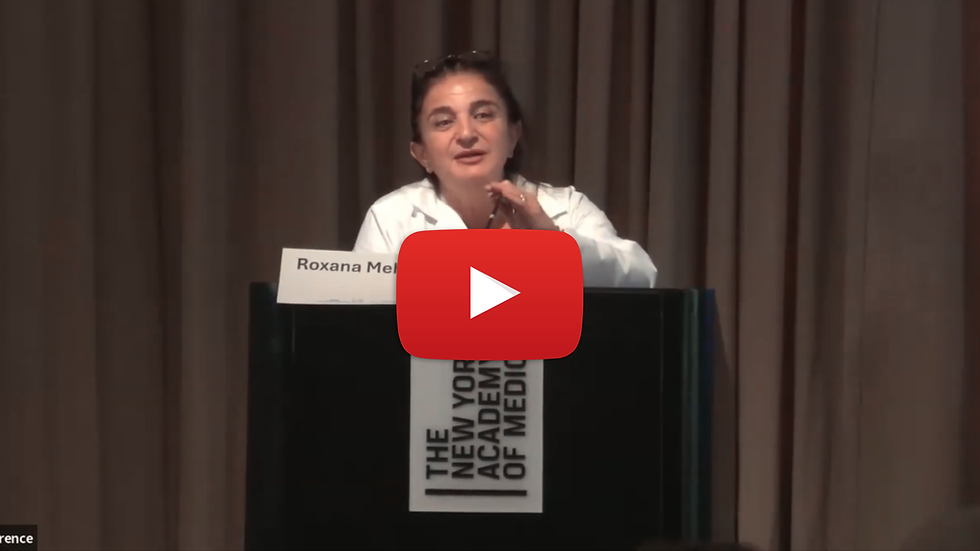





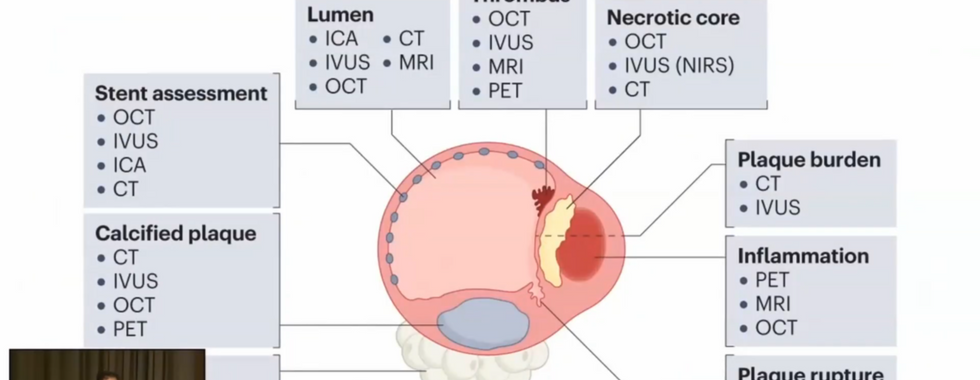







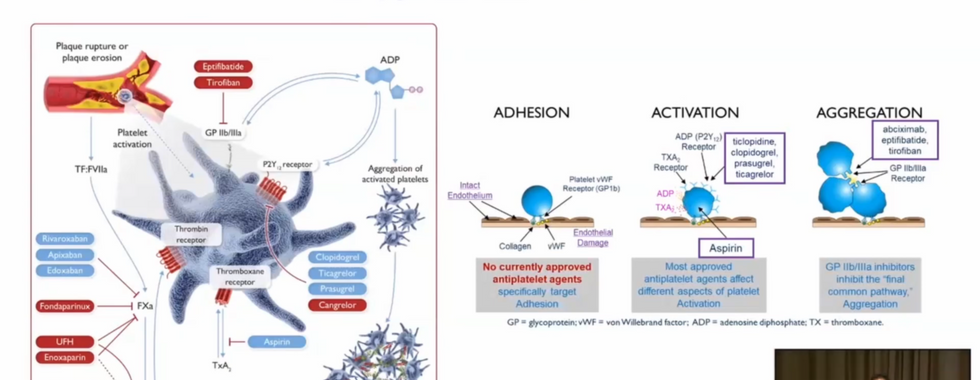

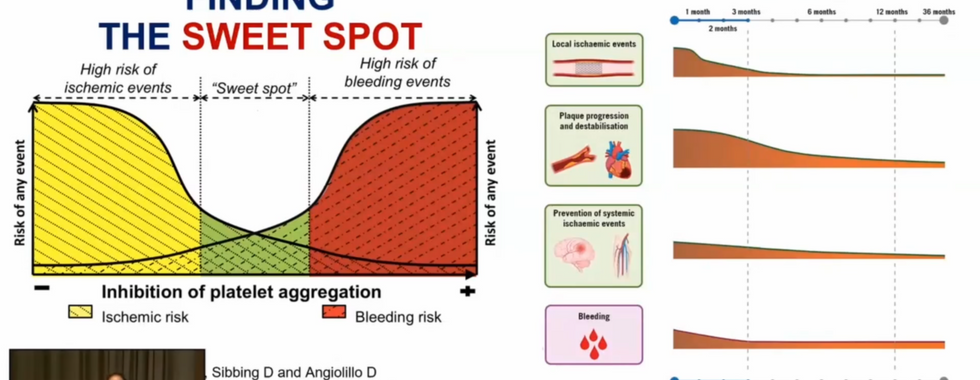













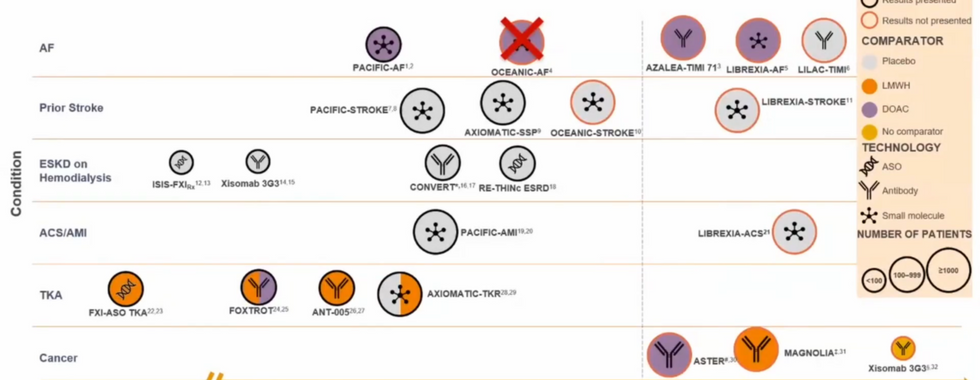







































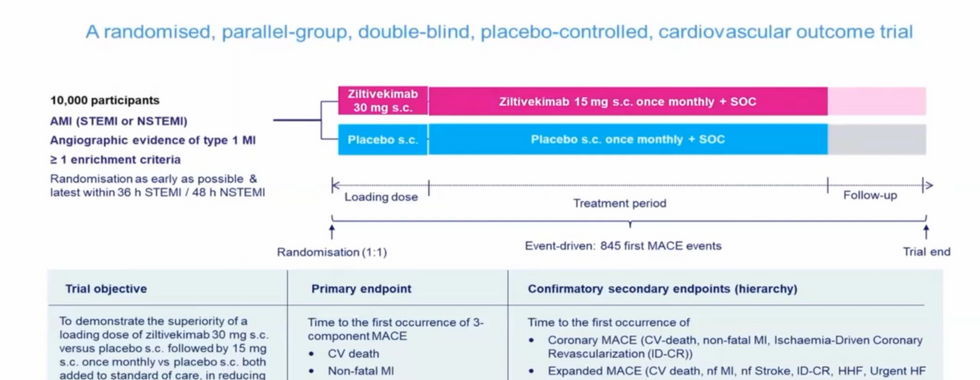





Comments